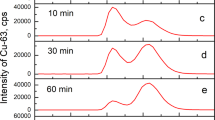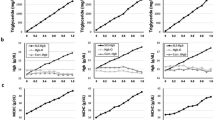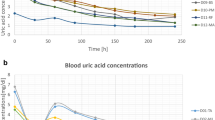Abstract
A TECHNIQUE has been developed in this laboratory for the rapid labelling of erythrocytes in vivo and in vitro using p-iodophenylhydroxylamine (I.C6H4.NH.OH) containing radioactive iodine. This compound, together with its green oxidation product p-iodonitrosobenzene (I.C6H4.NO), has a remarkable affinity for hæmoglobin, and in spite of its insolubility in water rapidly penetrates red cells and combines firmly and stoichiometrically with the cell pigment1. The reaction with hæmoglobin and some of its derivatives has been examined in detail and appears to be irreversible so long as the hæm molecule remains intact.
This is a preview of subscription content, access via your institution
Access options
Subscribe to this journal
Receive 51 print issues and online access
$199.00 per year
only $3.90 per issue
Buy this article
- Purchase on Springer Link
- Instant access to full article PDF
Prices may be subject to local taxes which are calculated during checkout
Similar content being viewed by others
References
Crick, J., and Jackson, H., Brit. J. Pharmacol. Chemother., 7, 142 (1952); and also in the press.
Author information
Authors and Affiliations
Rights and permissions
About this article
Cite this article
JACKSON, H. Studies with Erythrocytes labelled with Radioactive p-Iodophenylhydroxylamine. Nature 172, 80–81 (1953). https://doi.org/10.1038/172080a0
Issue Date:
DOI: https://doi.org/10.1038/172080a0
This article is cited by
-
Analysis of hemoglobin as a dose monitor for alkylating and arylating agents
Archives of Toxicology (1984)
Comments
By submitting a comment you agree to abide by our Terms and Community Guidelines. If you find something abusive or that does not comply with our terms or guidelines please flag it as inappropriate.



